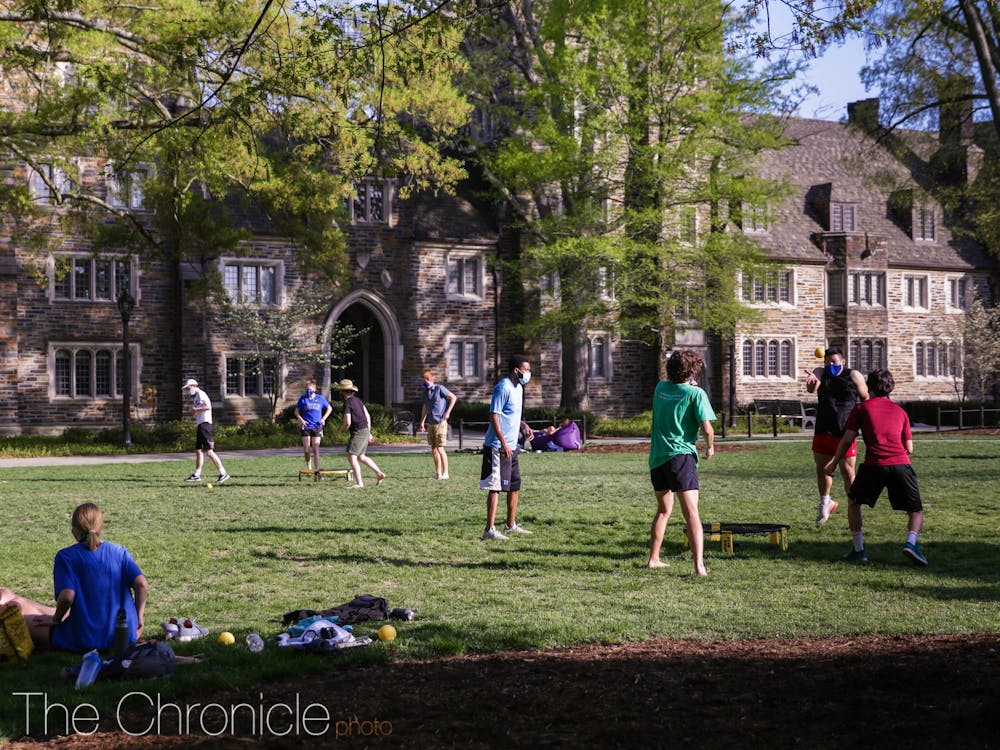More than a year after the rollout of Blue Devils Care, the program continues to offer students remote mental health services, but some students gave mixed reviews of their experiences.
Blue Devils Care is a partnership with TimelyMD, a tele-mental-health company, and offers 24/7 virtual counseling services to Duke students. Sessions can be scheduled or immediate, and the first 12 sessions are paid for by the University.
There has been a roughly 30% reduction in use of Counseling and Psychological Services during the pandemic, Jeff Kulley, CAPS associate director and director of clinical studies, wrote in an email.
This decrease has been seen at many other universities, according to Kulley. He wrote that he attributes the decline to student relocation and state licensure laws that limit the availability of services to students living out of state.
CAPS is open only to students living in North Carolina, while all degree-seeking Duke students living in the United States can access Blue Devils Care. TalkNow, the 24/7 Blue Devils Care service, can be accessed internationally in some situations, according to the program’s website.
Eighty percent of college students said in a recent survey that their mental health has been negatively impacted by the COVID-19 pandemic. The combination of difficulties in accessing treatment and worsening student mental health presents a hard challenge for college administrators.
Kulley wrote that students “have generally found [Blue Devils Care services] to be beneficial” and that most complaints have been related to technological concerns. He noted that Blue Devils Care counselors, who are not Duke employees, tend to lack campus-specific insight.
First-year Mac Hester said that his experience with the service was not very helpful.
“To be honest, it didn’t feel like she was super invested in me,” Hester said, referring to the Blue Devils Care professional he spoke to. “I was talking about very specific issues and she gave me super general information about mental health that I feel like I could look up online.”
First-year Kai Chen wrote that he “had a really great experience with Blue Devils Care.” He added that he wasn’t aware of the service until a friend told him about it.
“I think there’s a lot of mental health resources on campus,” he wrote, adding that he feels that Blue Devils Care is particularly underused.
Sophomore Cynthia Dong is the Duke Student Government senator of academic affairs who wrote a mental health student resource guide at the beginning of the pandemic. She said that while she appreciates Duke administration’s effort to address student mental health, she thinks that Duke could be doing more.
“I definitely don’t think it’s sufficient,” Dong said. She noted that the shift to remote service provision, among other things, has complicated the ability to address student issues.
“You can give students all the mental health services that they need, but if you don’t actively create academic policies that enable mental health, it’s kind of contradictory,” she said. Dong added that “it took a lot of advocacy [to the administration] on DSG’s part” to highlight student issues surrounding mental health. However, she noted, these conversations led to the creation of several wellness days this semester.
Hester echoed Dong’s frustrations with some elements of Duke’s approach to improving student mental health. He said that he wished Duke approached student mental health with an eye toward long-term solutions and a holistic understanding of psychological well being.
"Addressing mental health entails more than just providing resources to treat students’ problems. Effort could be taken to preemptively address issues before they even arise,” he said.
Despite student concerns, Kulley wrote that Duke students “tend to fare a bit better on measures of mental and emotional wellbeing” than other students from national samples.
Kulley believes that there is still a largely “unmet need for mental health services” for students, particularly because of the pandemic.
“I suspect that this ‘dormant' demand will start to show itself within the next year or two; and we may see a delayed surge in demand for on-campus mental health services after more aspects of life have returned to ‘normal,’” Kulley wrote.
Get The Chronicle straight to your inbox
Sign up for our weekly newsletter. Cancel at any time.
Connor Booher is a Trinity sophomore and a staff reporter for The Chronicle's 117th volume.

